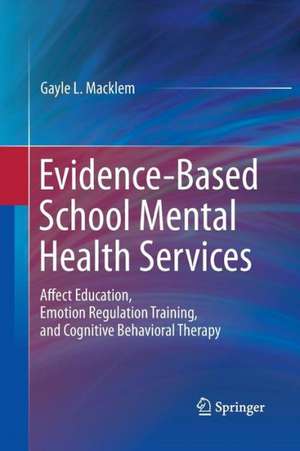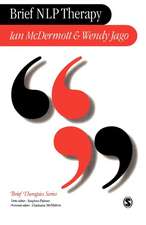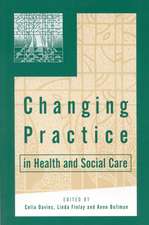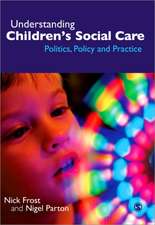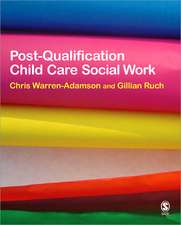Evidence-Based School Mental Health Services: Affect Education, Emotion Regulation Training, and Cognitive Behavioral Therapy
Autor Gayle L. Macklemen Limba Engleză Paperback – 8 oct 2014
Evidence-Based School Mental Health Services offers readers an innovative, best-practices approach to providing effective mental health services at school. The author draws on the widely used and effective three-tiered public health model to create a school-based system that addresses the emotional and behavioral needs of students most at risk for experiencing, or showing strong signs and symptoms of, emotional problems or disabilities. This prevention-oriented program adapts cognitive behavioral and other clinical therapies for use in primary through high school settings.
In several concise, easy-to-read chapters, the author addresses such important topics as:
- The rationale for building a three-tier mental health system in schools.
- The importance of making emotion regulation training available to all students.
- Designing strategies for adding affect education and emotion regulation training at each tier.
- Providing empirical support for implementing CBT in school settings.
- Preparing young children to benefit from school-based CBT.
Evidence-Based School Mental Health Services is a must-have resource forresearchers, scientist-practitioners, and graduate students in school psychology, clinical child psychology, pediatrics, psychiatry, social work, school counseling, education as well as for those who develop or influence public policy. And it is essential reading for any professional who is responsible for and interested in children’s well-being and development.
| Toate formatele și edițiile | Preț | Express |
|---|---|---|
| Paperback (1) | 562.28 lei 38-44 zile | |
| Springer – 8 oct 2014 | 562.28 lei 38-44 zile | |
| Hardback (1) | 649.22 lei 43-57 zile | |
| Springer – 10 ian 2011 | 649.22 lei 43-57 zile |
Preț: 562.28 lei
Preț vechi: 702.85 lei
-20% Nou
Puncte Express: 843
Preț estimativ în valută:
107.59€ • 112.62$ • 89.55£
107.59€ • 112.62$ • 89.55£
Carte tipărită la comandă
Livrare economică 26 martie-01 aprilie
Preluare comenzi: 021 569.72.76
Specificații
ISBN-13: 9781489982315
ISBN-10: 1489982310
Pagini: 316
Ilustrații: XVII, 297 p.
Dimensiuni: 155 x 235 x 17 mm
Greutate: 0.45 kg
Ediția:2011
Editura: Springer
Colecția Springer
Locul publicării:New York, NY, United States
ISBN-10: 1489982310
Pagini: 316
Ilustrații: XVII, 297 p.
Dimensiuni: 155 x 235 x 17 mm
Greutate: 0.45 kg
Ediția:2011
Editura: Springer
Colecția Springer
Locul publicării:New York, NY, United States
Public țintă
ResearchCuprins
Preface.- Acknowledgements.- List of Tables.- Specific Group Activities and Exercises.- The Challenge of Providing Mental Health Services in Schools.- Evidence-based Tier 1, Tier 2 and Tier 3 Mental Health Interventions in Schools.- Strengthening School-Counseling Interventions.- Affect Education at Tiers 1, 2, and 3.- Importance of Emotion Regulation Training for Children and Adolescents.- Emotion Regulation Training at Tiers 1, 2, and 3.- Support for the Use of CBT in Schools.- Preparing Young and/or Disabled Children to Benefit from CBT in School-based Settings.- CBT in Schools.- Sustainability, Current Programs and a Look to the Future.- References.
Recenzii
From the reviews:
“This book addresses how to offer mental health services in a school setting using a three-tiered public health model. … The author, a licensed school psychologist and a licensed educational psychologist with over 30 years of experience … is now an adjunct instructor at the Massachusetts School of Professional Psychology. … This is an easy to read and practical book on implementing mental health services in school settings. It is an excellent resource for school personnel and anyone involved in children’s mental health.” (Gary B. Kaniuk, Doody’s Review Service, June, 2011)
“Through comprehensive presentation of theory, research, and examples for practice, this book fills the gap of what school personnel need to know to begin to implement mental health services within an educational setting. … Scientists and practitioners will find this book a great resource for learning the concepts and pragmatic implications of mental-health service delivery in schools. … book will be an asset to those wishing to learn more about the complicated, and extremely important, topic of providing mental health supports to youth in schools.” (Joshua C. Felver-Gant and Sarah L. Levi, Journal of Child and Family Studies, Vol. 20, 2011)
“This book addresses how to offer mental health services in a school setting using a three-tiered public health model. … The author, a licensed school psychologist and a licensed educational psychologist with over 30 years of experience … is now an adjunct instructor at the Massachusetts School of Professional Psychology. … This is an easy to read and practical book on implementing mental health services in school settings. It is an excellent resource for school personnel and anyone involved in children’s mental health.” (Gary B. Kaniuk, Doody’s Review Service, June, 2011)
“Through comprehensive presentation of theory, research, and examples for practice, this book fills the gap of what school personnel need to know to begin to implement mental health services within an educational setting. … Scientists and practitioners will find this book a great resource for learning the concepts and pragmatic implications of mental-health service delivery in schools. … book will be an asset to those wishing to learn more about the complicated, and extremely important, topic of providing mental health supports to youth in schools.” (Joshua C. Felver-Gant and Sarah L. Levi, Journal of Child and Family Studies, Vol. 20, 2011)
Notă biografică
Gayle L. Macklem, MA, NCSP, LEP, is a Massachusetts-licensed school psychologist and a Massachusetts-licensed educational psychologist. She has served in the field of education for over 30 years. A former president of the Massachusetts School Psychologists Association (MSPA), she serves as the Technology Chairperson of the state association. She is an adjunct instructor in School Psychology at the Massachusetts School of Professional Psychology (MSPP) in Boston. She writes curriculum and writes on topics of interest to educators. She is a frequent presenter at regional and national conferences. Ms. Macklem is the author of Springer’s Practitioner's Guide to Emotion Regulation in School-Aged Children (2008) and Bullying and Teasing: Social Power in Children’s Groups (2003).
Textul de pe ultima copertă
The challenges of providing mental health services to school children are numerous and diverse, ranging from staffing shortages to insufficient funding to family resistance to administrative indifference. Yet with the U.S. Surgeon General estimating that approximately 20% of young people display signs of psychological problems, the need for such services – particularly for interventions that not only address mental health issues but also reinforce protective factors – is considerable.
Evidence-Based School Mental Health Services offers readers an innovative, best-practices approach to providing effective mental health services at school. The author draws on the widely used and effective three-tiered public health model to create a school-based system that addresses the emotional and behavioral needs of students most at risk for experiencing, or showing strong signs and symptoms of, emotional problems or disabilities. This prevention-oriented program adapts cognitive behavioral and other clinical therapies for use in primary through high school settings.
In several concise, easy-to-read chapters, the author addresses such important topics as:
Evidence-Based School Mental Health Services is a must-have resource for researchers, scientist-practitioners, and graduate students in school psychology, clinical child psychology, pediatrics, psychiatry, social work, school counseling,education as well as for those who develop or influence public policy. And it is essential reading for any professional who is responsible for and interested in children’s well-being and development.
Evidence-Based School Mental Health Services offers readers an innovative, best-practices approach to providing effective mental health services at school. The author draws on the widely used and effective three-tiered public health model to create a school-based system that addresses the emotional and behavioral needs of students most at risk for experiencing, or showing strong signs and symptoms of, emotional problems or disabilities. This prevention-oriented program adapts cognitive behavioral and other clinical therapies for use in primary through high school settings.
In several concise, easy-to-read chapters, the author addresses such important topics as:
- The rationale for building a three-tier mental health system in schools.
- The importance of making emotion regulation training available to all students.
- Designing strategies for adding affect education and emotion regulation training at each tier.
- Providing empirical support for implementing CBT in school settings. Preparing young children to benefit from school-based CBT.
Evidence-Based School Mental Health Services is a must-have resource for researchers, scientist-practitioners, and graduate students in school psychology, clinical child psychology, pediatrics, psychiatry, social work, school counseling,education as well as for those who develop or influence public policy. And it is essential reading for any professional who is responsible for and interested in children’s well-being and development.
Caracteristici
Examines research supporting evidence-based school mental health interventions Examines school mental health services in the context of the three-tiered model Explores affect education and emotion regulation training – combined with CBT – to strengthen the effectiveness of school-based interventions Includes supplementary material: sn.pub/extras
